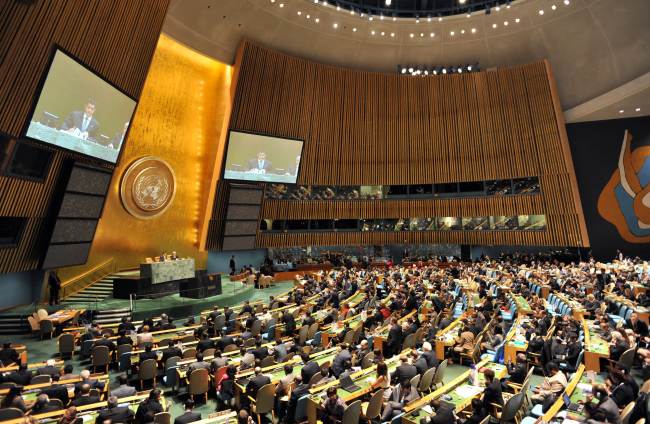
South Korea was elected Thursday as a non-permanent member of the U.N. Security Council, regaining ground to step up its involvement in handling the North Korea issue and other global security challenges.
"South Korea will be able to take leading part in the U.N.'s efforts for world peace and security and holding a seat again on the Security Council is also expected to contribute to the stable management of situations on the Korean Peninsula," Seoul's foreign ministry said in a statement.
South Korea's election, it added, is viewed as reflecting the international community's evaluation of Seoul's role so far and expectation for potential contributions.
South Korea was chosen in the second round of balloting at the U.N. General Assembly, beating Cambodia 149-43. Bhutan was eliminated in the first round.
The three vied for one seat up for grabs in the Asia-Pacific category.
South Korea will serve as a member of the 15-nation council for two years, starting Jan. 1. It will mark the second time Seoul has taken a temporary seat on the body, following a term in 1996-97.
The Security Council is the U.N.'s top decision-making body, tasked with maintaining world peace.
"If the first term provided lessons on U.N. diplomacy, now is the stage for South Korea to show maturity in both quality and quantity," said Kim Sook, Seoul's ambassador to the U.N. "It would serve as a chance to solidify the stature as a middle power in the international community and expand substantial contributions."
South Korea is scheduled to hold the rotating presidency of the council in February in accordance with alphabetical order.
Four other nations -- Rwanda, Argentina, Australia, and Luxembourg -- also became new members of the council.
The U.S. welcomed the new members. "We look forward to a strong and productive partnership with these incoming members to address issues fundamental to international peace and security, including nuclear non-proliferation, counter-terrorism, conflict prevention and resolution, promotion of democracy and human rights, and the oversight of complex U.N. field operations," said Susan Rice, U.S. ambassador to the United Nations.
South Korea has come of age when it comes to its U.N. membership, as it joined the organization in 1991 along with North Korea.
Ban Ki-moon, formerly South Korean foreign minister, is serving as U.N. secretary general.
Korea experts in the U.S. agreed that South Korea's election as a council member reflects its enhanced status on the global stage.
"It's an important advantage for Seoul to have a voice at the table when some of the Security Council's decisions in the near future will likely involve North Korea," said Denny Roy, senior researcher at the East-West Center in Honolulu, Hawaii.
Bruce Klingner, senior analyst at the Heritage Foundation in Washington, also said it "will be seen domestically as another manifestation of its growing influence in international affairs," adding, "The position will allow Seoul to participate in important Security Council matters, including deployment of peacekeeping forces."
But he played down South Korea's election against less than stellar rivals.
"Although South Korea looks for events to extol its having 'arrived on the world stage' (e.g. 1988 Olympics, hosting G-20 and nuclear security summit), there is perhaps less that meets the eye to the selection," he said by email. (Yonhap)



![[AtoZ into Korean mind] Humor in Korea: Navigating the line between what's funny and not](http://res.heraldm.com/phpwas/restmb_idxmake.php?idx=644&simg=/content/image/2024/04/22/20240422050642_0.jpg&u=)
![[Exclusive] Korean military set to ban iPhones over 'security' concerns](http://res.heraldm.com/phpwas/restmb_idxmake.php?idx=644&simg=/content/image/2024/04/23/20240423050599_0.jpg&u=20240423183955)



![[Graphic News] 77% of young Koreans still financially dependent](http://res.heraldm.com/phpwas/restmb_idxmake.php?idx=644&simg=/content/image/2024/04/22/20240422050762_0.gif&u=)
![[Herald Interview] Why Toss invited hackers to penetrate its system](http://res.heraldm.com/phpwas/restmb_idxmake.php?idx=644&simg=/content/image/2024/04/22/20240422050569_0.jpg&u=20240422150649)





![[Exclusive] Korean military to ban iPhones over security issues](http://res.heraldm.com/phpwas/restmb_idxmake.php?idx=652&simg=/content/image/2024/04/23/20240423050599_0.jpg&u=20240423183955)



![[Today’s K-pop] Ateez confirms US tour details](http://res.heraldm.com/phpwas/restmb_idxmake.php?idx=642&simg=/content/image/2024/04/23/20240423050700_0.jpg&u=)